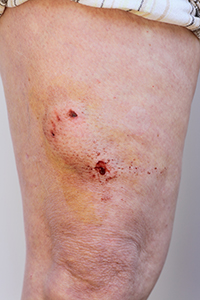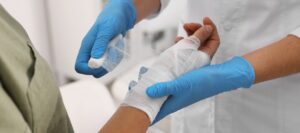
Infections Caused By Animal Bites
Different types of animal bites carry different risks for bacteria. Primates, rodents, swine, herbivores, cats, and dogs all carry different types of bacteria—some which overlap, and some unique.
Some of the common bacteria associated with dog bites:
- Staphylococcus
- Streptococcus
- Proteus
- Prevotella
- Moraxella
- Pasteurella
Some of the common bacteria associated with cat bites:
- Pasteurella
- Bacteroides
- Wolinella
- Actinomyces
Preventing Infection From Animal Bites
The most important thing you want to focus on after any animal bite is preventing infection. Invading bacteria may enter the wound on site of contact, or after due to improper wound treatment. A medical professional is necessary to catch bacteria early on before problems have a chance to progress. (Read More Information)
How To Know If An Animal Has Rabies
If an animal unexpectedly bites you, you might be worried about rabies. Rabies silently lives and grows in muscle tissue; it can take up to 3 months after contracting rabies for any signs or symptoms to appear. Rabies can also surface within days of contraction. Rabies takes between 12 and 180 days to travel from the peripheral nerves through the central nervous system. Once rabies reaches the central nervous system, all signs become notable. Case-by-case, different signs become notable at different times.
Some key signs your pet has rabies include:
- Not wanting to eat
- A bite-mark, or wound that they want to continually chew at
- Fever
- Personality change (might only be very slight at first)
- Different tone to their bark or meow
(Learn More)
Cats, bats, dogs, foxes, and raccoons have all been identified as a source of rabies. Meaning both wild and domesticated animals can pose a threat. To help keep you safe, you can have your pets vaccinated against rabies. When it comes to wild or unknown animals, it’s best to stay away, no matter how cute and domesticated they appear.
What To Do After An Animal Bites You
The moments after an animal bites you are crucial, what you do in these minutes can change your overall healing process.
Here are 4 steps to follow after an animal bite:
- Clean the wound immediately using soap and water
- To help stop the bleeding, apply a clean towel over the wound and hold in place with pressure
- Place a sterile bandage over the wound to keep out potential infections
- Visit your local Urgent Medical Center to ensure your wound can heal on its own and is not infected, or at risk for infection
When To Visit The Doctor For An Animal Bite
There are times animals bite and the results are not bad enough to warrant medical attention, or much concern at all. If you have cats, you likely get your share of shallow bites and scratches on a regular basis. For more serious bites you should always get medical attention to prevent infection and improper healing.
You should visit the doctor for an animal bite if one or more of the following applies:
- You have a deep gash wound, which can be especially dangerous on your head, hand, or feet
- If you have a pre-existing condition such as AIDS, diabetes, or any other disorder that weakens your immune system
- If you suspect a broken bone
- If the bleeding does not cease after 15 minutes of pressure. This may indicate nerve damage or more serious injury
- You have not had a tetanus vaccination in over 5 years
- A wild animal, or other unknown animal, has caused the bite
At Urgent Medical Center your health and well-being is our first priority; from animal bites to bad colds, we’ve got you covered.





